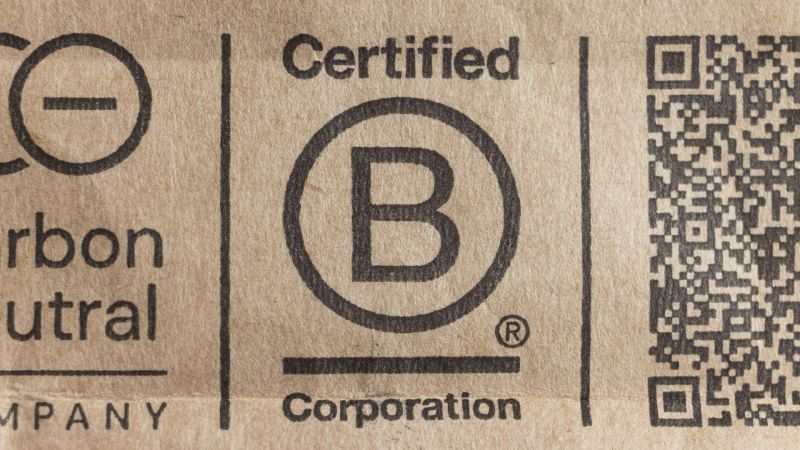Does B Corp Certification Motivate Customers?
The global symbol of conscious capitalism can positively influence purchasing decisions, experts say—but only when they know what it means

It’s the grocery run, and you’re stocking up on yogurt. You gravitate towards the stalwart brand you’ve bought for years. But, just as you’re about to drop it in your cart, you see a competing product—this one with a striking black-and-white logo on the label indicating that the company behind it is a Certified B Corporation, or B Corp.
You pause, taking a moment to reflect on the moral implications of your buying power. After doing a quick cost-benefit analysis, you choose to try the B Corp yogurt. You leave the dairy aisle feeling satisfied—maybe even a bit virtuous.
That’s the kind of reaction B Corp certification is meant to spark.
But what if you don’t recognize the logo? What if you don’t have the time or inclination to Google it? What if it confuses you? (Is “B” supposed to mean “worse than A,” and, if so, should you not be buying from an A Corp?)
If you’re among the unfamiliar, B Corporation Certification—B Corp, for short—is a global designation meant to indicate businesses that meet the highest standards of social and environmental performance. Earning the seal (and recertifying, which takes place every three years) can be a complicated and comprehensive process that includes everything from quantifying a company’s environmental footprint, to disclosing fair labour practices, to adopting a legal framework that accounts for all stakeholders—not just shareholders.
The certification has been around for nearly two decades, but in recent years it’s gained notable momentum. Since 2020, the number of B Corps has more than doubled, to upwards of 9,000 globally. Household names like Ben & Jerry’s, Warby Parker, and Patagonia sport the seal, alongside banks, law firms, and several hundred management consultancies. Canada now claims more than 550 certified companies, comprising a diverse mix of consumer-facing and business-to-business brands. While the B Corp movement is not without critics—indeed, venerable U.S. soapmaker Dr. Bronner’s recently accused the program of lax standards—there is no question that it is a movement with growing appeal.
What’s a little less clear is how B Corp certification impacts customer decision-making and, in turn, revenue. Does the increasingly prominent seal—and the values and accomplishments it’s meant to convey—move people to make a purchase? As Smith Business Insight contributor Deborah Aarts found in speaking with Smith alumni and faculty, it definitely can—but that doesn’t mean it always does. At least, not yet.
The promise: A symbol of trust
On paper, B Corp certification seems perfect for the current moment. We’ve never had more information about the companies we buy from, and roughly half of us feel compelled to use our purchasing power for good. “We know that in the general public there is an increasing awareness of, and concerns about, how our economic systems are influencing social and environmental problems,” explains Juan Francisco Chavez Ramirez, an assistant professor at Smith School of Business whose research and teaching spans sustainability, strategic management and organization studies. “We see more and more customers trying to align their values to their purchasing decisions—to vote with their wallets.” These customers are also increasingly wary of false or exaggerated claims, Chavez Ramirez continues, which is deepening the appeal of independent third-party verification.
For conscious consumers, the B Corp seal can serve as a handy visual symbol that a product or service is a responsible choice, which can positively influence both their intent to buy and their willingness to pay a premium. “It can simplify the decision-making process,” Chavez Ramirez says. “For some consumers, it’s more convenient to rely on a recognizable and trusted logo than to read a long list of ingredients or conduct extensive research on a company’s sustainability standards on your own.”
It is also meant to arm certified companies with a credible marker of their full value proposition. “It can be very helpful to have third-party validation that your company has set high standards—and that you live or die by them,” says Commerce alum Jacqueline Prehogan, BCom’07 and co-founder and chief brand officer of pet food manufacturer Open Farm, which first earned B Corp certification in 2024.
Prehogan says the process didn’t require the company to make many major changes: Open Farm has been applying ethical practices since it launched in 2014, such as only using humanely raised meats in its products. But certification has given the company a new way to quickly communicate this diligence to potential buyers, she says: “It can provide customers with a layer of comfort.”
The reality: An awareness gap
Of course, customers can only be moved by the B Corp logo if they understand what they’re looking at, and not all of them do. Research from B Lab—the non-profit behind the certification—asserts that there can be a strong link between awareness of the B Corp brand and buying decisions. But that correlation occupies a relatively small sample size: three-quarters of the global population is unfamiliar with the certification (it’s closer to two-thirds in Canada).
“The tricky thing about the B Corp logo is that, compared to other certifications, it is not self-explanatory,” Chavez Ramirez says. Badges meant to denote organic, vegan or fairly traded goods tend to be clear and literal in what they stand for, he says. But for customers encountering the B Corp logo for the first time—on a company’s website or on a product label in a store—there’s little in the achromatic icon that conveys the multifaceted standards that those who brandish it have met. “Even if people are familiar with it, they still might not know exactly what it means, beyond a general sense that ‘OK, this is a good thing,’” says Chavez Ramirez.
Essentially, B Corp means a lot to some customers and nothing at all to others—and much of the work to bridge the gap falls to certified companies based on their understanding of their current and prospective audiences. “It’s become a matter of strategic importance for businesses to craft their messaging about the certifications they have in a way that is both truthful and resonates with their customers,” Chavez Ramirez explains.
MBA alum Kristi Soomer, MBA’09, has come to understand the full scope of B Corp awareness. As founder and CEO of sustainable clothing brand Encircled, she originally pursued B Corp certification as a matter of integrity: Many other apparel lines were making unsubstantiated claims of ethical manufacturing and sourcing and she wanted third-party authentication that Encircled’s own practices were legitimate. “We wanted proof that we were walking the talk,” she said.
So, once Encircled earned certification in 2018, Soomer and her team were not at all quiet about it. They wrote blogs, newsletters and social media posts explaining the work that went into the milestone. They added the B Corp seal to the company’s website, to the hang tags on clothing, and to the care tags on garments themselves. Encircled’s superfans—the kind of diligent clientele who care deeply about details like yarn provenance—love it. Less fervent customers are happy to learn about it. But the seal has not yet in and of itself been a source of significant business from new customers. “People who know about B Corp certification really do trust it,” Soomer says. “I just don’t think there’s a lot of awareness yet, beyond hyper-informed customer spaces. It’s still pretty niche.”

The potential: A ripple effect
Soomer’s experiences track with those of Commerce alum, Robin Kovitz, BCom’02. Kovitz sought certification for Baskits Inc.—the premium gift purveyor she leads as president and CEO—for reasons that were part strategic, and part ideological. The company has been certified since mid-2024 “Obviously, I understand that the purpose of an enterprise is to make money, but I also think there’s space for businesses to do the right thing and to add value without doing harm,” Kovitz says. “For us, B Corp certification provides a quantitative measure of what it means to engage in that kind of conscious capitalism.”
Baskits hasn’t been a B Corp long enough to measure its full impact on revenue, but Kovitz says there’s early evidence that it resonates with buyers—if they’re familiar with it. For example, the company has been invited to bid on corporate contracts by organizations working towards their own environment, social and government goals; These wouldn’t have been an option prior to certification. And when Kovitz brings certification up in discussions with potential clients—something she makes a point to do—it does tend to create opportunities. “The response is almost always, ‘That’s amazing. It only strengthens our decision to work with you.’” Some clients have even started investigating certification for themselves.
“I think the public is starting to recognize it, and I’m hopeful it will one day be a household name,” Kovitz says. “But there is still some unfamiliarity about what it means, so I think we all have to work to get the word out over the next decade.”
It might not take that long. Experts expect the pool of conscious consumers to grow, as more ideologically motivated Gen Zers come into their purchasing power. With surging geopolitical uncertainty, Canadians are paying more attention to the provenance of their purchases. This could raise the profile of B Corps, which have already seen to the sustainability of their supply chains. And if the number of certified companies continues to expand at the rate of the past five years, volume alone will help grow B Corp’s clout. “It might not be a huge ripple right now, but as more and more businesses subscribe to this, it’s going to combine into something big,” Kovitz reasons.
Even if we are years away from B Corp becoming a key purchasing consideration among the general public, many companies who’ve been through the certification process say it has deeper business utility. Being a B Corp can strengthen internal alignment and reinforce structures of accountability within an organization, keeping teams true to their ideals. Certification can also be a powerful way to attract top-calibre employees who want to do socially and environmentally responsible work. And it introduces certified organizations to other like-minded businesses, which can spark real connections and opportunities. (Each of the entrepreneurs consulted for this piece singled out the value of being part of the global B Corp community as a key benefit.)
“We’re doing it for a better collective future that we believe the planet and its people deserve,” Soomer sums up. “I feel there’s a movement of people coming up who feel the same way, and I think more of them are starting to see B Corps as a lever to make impact through how they choose to spend their dollars. So, my hope is that this will snowball.”





